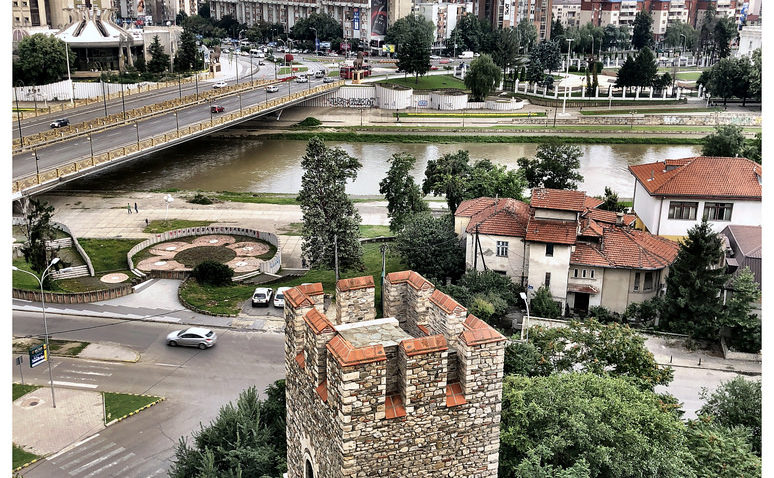Compiled by Eva Jovanova and Hristo Voynov
1. Macedonia’s referendum on its name change did not meet the necessary turnout for its results to be taken into consideration. Around 37% of the Macedonian registered voters showed up and voted, and more than 90% of the votes were cast in favor of Macedonia’s Euro-Atlantic integration. The next step is to try to pass the constitutional amendments in Parliament in which the government coalition is currently missing less than 10 MPs to have a super majority, or for the government to schedule early elections. Around 600.000 people (of less than 1.8 million voters) supported Euro-Atlantic integration in a non-binding referendum this Sunday.
2. The U.S. and Russian spy drama continues yet another week. The US indicted 7 Russian military intelligence officers from the GRU who were targeting anti-doping agencies, while Russia accused the US of running a covert biological weapons facility in Georgia. Both defend the allegations against them, with Russia claiming the indictments are part of the US’ disinformation campaign against it. On the other hand, the US embassy released a statement which states the Lugar Center, which it provides funding to, is a research facility that is tasked with researching treatment for various diseases in a strictly non-military fashion. Russia claims that 73 individuals died after tests done in the Lugar center.
3. Romania’s referendum also causes much tension in Europe. This weekend people will cast their votes if they support changing the wording of the constitution to recognize that marriage is just between a man and a woman. Gay marriage, which is already illegal, would become harder than ever to legalize. Coalition for family gathered three million votes for the referendum to happen, thus it is not directly affiliated with a single party. The main narratives behind it are “protection of the children” and attacks on Europe’s pinkness. The LGBT communities in Romania will boycott the referendum, but the Orthodox Church, as well as all but one political parties in Parliament, are backing it.
4. Four individuals have been arrested in Slovakia in connection to the murder of investigative journalist Ján Kuciak and his fiancée Martina Kušnírová. For now, little has been revealed behind their motives because the investigation is still ongoing, even if the main suspects have been arrested and charged. One is cooperating with police and has supposedly informed them that the controversial Businessman Marian Kočner was the one who ordered the hits. Europol helped with the investigation, which makes sense because of the alleged Italian and Albanian organized crime links to the murder.
5. Kosovo’s main opposition party Vetevendosje organized a protest last Sunday against the proposed “border correction” between Kosovo and Serbia. Thousands of people attended the rally in the center of Prishtina, Kosovo’s capital. Serbia’s head of the office for Kosovo, Marko Djuric, and Serbia’s Interior Minister stated they had all special units on high alert during the protest, in case they needed to intervene to the protection of Serbs in Northern Kosovo. NATO’s peacekeeping force, KFOR, was also present during the demonstrations to ensure they don’t go out of control.
6. Ukraine has expelled a Hungarian consul over his hosting citizenship ceremonies. Hungarian Foreign Minister Péter Szijjártó described this as Ukraine’s attempt to intimidate the Hungarian population, while Ukraine sees this as Hungary overreaching its ethnic ties to the region. Hungary’s direct response was to expel a Ukrainian consul, though the more long-term response will surely be complicating its efforts to get closer to the EU.
7. Bosnia and Herzegovina prepares for its presidential elections this Sunday. The leader of Republika Srpska(RS), Milorad Dodik who is contesting on the elections for the tripartite Presidency, already paid a visit to RS’ biggest supporter, Vladimir Putin. Dodik’s separatist rhetoric, even though it has abated lately, it sure will continue to undermine the already fragile institutions of the country. Dodik will most likely meet his Croatian counterpart, the Croatian nationalist Dragan Covic, in the tripartite rotating Presidency.
8. Oleg Sentsov, the Ukrainian filmmaker whose stay in a Russian prison has turned him into a folk hero in Ukraine, has ended his hunger strike after 140 days. He was initially sentenced to 20 years in a labor prison after being convicted of plotting terrorist attacks in annexed Crimea, charges that his supporters say are fabricated to punish him for his opposition to the annexation. He is forced to end the campaign after Russian medical staff decided it was time to force feed him, often done when a hunger strike starts to deteriorate a person’s health.
9. Croatian streets were also invigorated last weekend. Hundreds of activists marched through the streets of Croatia’s capital, Zagreb, in support of abortion rights. Abortion is legal in Croatia since 1978, but the increasing number of doctors who refuse to perform it makes it practically impossible for women to undergo it. Lawmakers, under Constitutional Court orders, are rushing to meet their February deadline to rewrite the country’s abortion laws.
10. Czechia prepares for local elections over the weekend which may change the current balance of power. It is seen as an unofficial referendum on whether the current ANO led government and it is expected that the Civic Democrats and the Pirate Party will be gain a significant amount of seats. The most important race will be for the mayor’s office in the capital city of Prague.


0 comments